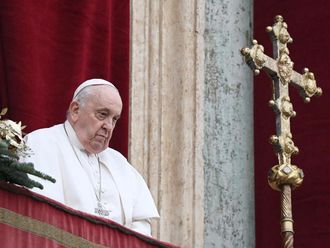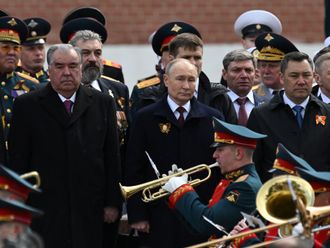Brussels: Britain and its Nato allies are to review their preparedness for a nuclear stand-off with Russia in response to Vladimir Putin’s threats to upgrade his arsenal.
In a return to Cold War strategies, defence ministers are due to hold an additional meeting of the Nato Nuclear Planning Group to review what they know about the Kremlin’s nuclear policies.
Western planners are concerned they are not clear of the seriousness of Mr Putin’s increasingly aggressive threats to deploy nuclear weapons.
The meeting comes at a time when the UK Government is under pressure to keep defence spending over the Nato threshold of 2 per cent of GDP.
However, the Ministry of Defence last year changed the way it reports its spending, in a move that allowed it to count money including soldiers’ rent towards the target.
Michael Fallon, the Defence Secretary, denied that Britain was “padding out our numbers”. He also voiced his concern last night that Nato did not fully understand Russia’s nuclear rhetoric.
Throughout the Cold War, Nato and the Warsaw Pact countries employed thousands of analysts to study the policies behind each other’s nuclear arsenals, but this work ceased after the collapse of the Soviet Union.
Now, officials fear they may be in the dark as to where nuclear weapons sit in Russia’s order-of-battle, or how Mr Putin they would “signal” their imminent use. They are concerned that the loss of the vocabulary of nuclear dialogue risks innocent actions by Nato being misinterpreted by the Kremlin.
Mr Fallon said: “Russia’s nuclear messaging is not helpful and it is important that we better understand its implications for the alliance.” Nato yesterday announced the creation of a 40,000-strong rapid-response force to defend Europe’s border with Russia.
Britain has committed pounds 750,000 to create a counter-propaganda unit at Nato’s headquarters in Brussels.
The small team will use traditional methods and social media to “puncture the myths and lies” produced by Russian-backed broadcasters in Europe.
Some officials believe Nato should resume full-scale nuclear exercises to rehearse responses to an attack.
Mr Putin last week said Russia would this year put 40 new nuclear-armed intercontinental ballistic missiles into service, a move that Jens Stoltenberg, the Nato secretary-general, described as “dangerous sabre-rattling”.
Russian state televisions programmes are filled with calls by pundits to launch a strike on the United States.
The Nuclear Planning Group was set up in 1967 to determine how missiles should be distributed among Nato members, but in recent years has met only annually.
Its diminished role earned it the nickname “Nato Plays Golf”.
A Nato official said: “The Russian leadership is rhetorically lowering the threshold when it comes to nuclear weapons and this is something which should not be done.
It largely wasn’t done even during the Cold War.
We are examining it carefully.” Nato’s forecast for 2015 shows Britain spending 2.1 per cent of GDP on defence, or pounds 39? billion.
However, it is understood that Britain benefited from new accountancy rules that allowed it to report income generated by the MoD internally, as well as the cash provided by the Treasury.
This allowed Britain to report an extra pounds 1.2? billion that had come from internal receipts.
The items included pounds 318? million in receipts from soldiers, much of which was the rent paid for married quarters or houses.
One analyst said that without the receipts, Britain would still have met the two per cent target.
Mr Fallon said that Britain had filed a return provided by Nato.











